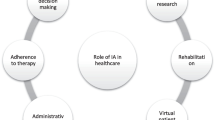Abstract
Artificial intelligence (AI) is revolutionizing healthcare, and with this transformative innovation comes the challenge of responsibly integrating AI into clinical care. AI has the potential to improve patient outcomes, increase the efficiency of healthcare diagnosis and treatment, and lower the cost of care. Leveraging these benefits, however, requires attention to the ethical risks raised by this new technology. In this chapter, I illuminate the primary ethical challenges of AI in healthcare and argue that in order to fully realize the potential of AI to improve individual and population health, we need to align AI with the ethical principles of medicine. The ethical challenges posed by AI can be categorized into the four principles commonly used in healthcare ethics: respect for autonomy, beneficence, nonmaleficence, and justice [1]. Careful consideration of the implications of these principles will allow us to maximize the benefits of AI in healthcare.
Access this chapter
Tax calculation will be finalised at checkout
Purchases are for personal use only
Similar content being viewed by others
References
Beauchamp TL, Childress JF. Principles of biomedical ethics. 5th ed. New York: Oxford University Press; 2001.
Castelvecchi D. Can we open the black box of AI? Nature. 2016;538(7623):20–3.
De Fauw J, Ledsam JR, Romera-Paredes B, Nikolov S, Tomasev N, Blackwell S, et al. Clinically applicable deep learning for diagnosis and referral in retinal disease. Nat Med. 2018;24:134250. https://doi.org/10.1038/s41591-018-0107-6.
Pellegrino ED, Thomasma DC. The conflict between autonomy and beneficence in medical ethics: proposal for a resolution. J Contemp Health Law Policy. 1987;3:23.
Ada. Your personal health guide. https://ada.com; 2021.
van der Heijden AA, Abramoff MD, Verbraak F, van Hecke MV, Liem A, Nijpels G. Validation of automated screening for referable diabetic retinopathy with the IDx-DR device in the Hoorn Diabetes Care System. Acta Ophthalmol. 2018;96(1):63–8. https://doi.org/10.1111/aos.13613.
Salim M, Wåhlin E, Dembrower K, et al. External Evaluation of 3 Commercial Artificial Intelligence Algorithms for Independent Assessment of Screening Mammograms. JAMA Oncol. 2020;6(10):1581–1588. https://doi.org/10.1001/jamaoncol.2020.3321
Brinker TJ, Hekler A, Enk AH, Berking C, Haferkamp S, Hauschild A, et al. Deep neural networks are superior to dermatologists in melanoma image classification. Eur J Cancer. 2019;119:11–7.
GDPR Article 9 (2) a.
GDPR Article 22.
Aitken M, de St Jorre J, Pagliari C, et al. Public responses to the sharing and linkage of health data for research purposes: a systematic review and thematic synthesis of qualitative studies. BMC Med Ethics 2016;17(1):73.
Utermohlen K. Four robotic process automation (RPA) applications in the healthcare industry. Medium, 2018. https://medium.com/@karl.utermohlen/4-robotic-process-automation-rpa-applications-in-the-healthcare-industry-4d449b24b613
Amodei D, Olah C, Steinhardt J. Concrete problems in AI safety. arXiv [cs.AI]. 06565. 2016.
Wong A, Otles E, Donnelly JP, et al. External Validation of a Widely Implemented Proprietary Sepsis Prediction Model in Hospitalized Patients. JAMA Intern Med. 2021;181(8):1065–1070.
Oh J, et al. A generalizable, data-driven approach to predict daily risk of Clostridium difficile infection at two large academic health centers. Infect Control Hosp Epidemiol. 2018;39:425–33.
Hernandez D, Greenwald T. IBM has a Watson dilemma. The Wall Street Journal. August 11, 2018. www.wsj.com/articles/ibm-bet-billions-that-watson-could-improve-cancer-treatment-it-hasnt-worked-1533961147
Char DS, Shah NH, Magnus D. Implementing machine learning in health care – addressing ethical challenges. N Engl J Med. 2018;378(11):981–3.
Cabitza F, Rasoini R, Gensini GF. Unintended consequences of machine learning in medicine. JAMA. 2017;318(6):517–8.
Ferryman K, Winn RA. Artificial intelligence can entrench disparities: here’s what we must do. The Cancer Letter, Nov 2016.
Wiens J, Saria S, Sendak M, Ghassemi M, Liu VX, Doshi-Velez F, Jung K, Heller K, Kale D, Saeed M, et al. Do no harm: a roadmap for responsible machine learning for healthcare. Nat Med. 2019;25(9):1337–40.
Rajkomar A, Hardt M, Howell MD, Corrado G, Chin MH. Ensuring fairness in machine learning to advance health equity. Ann Intern Med. 2018;169(12):866–72. https://doi.org/10.7326/M18-1990.
Obermeyer Z, Powers B, Vogeli C, Mullainathan S. Dissecting racial bias in an algorithm used to manage the health of populations. Science. 2019;366(6464):447–53. https://doi.org/10.1126/science.aax2342.
Ada Lovelace Institute. Black data matters: how missing data undermines equitable societies. https://www.adalovelaceinstitute.org/black-data-matters-how-missing-data-undermines-equitable-societies
Adamson AS, Smith A. Machine learning and health care disparities in dermatology. JAMA Dermatol. 2018;154(11):1247–8. https://doi.org/10.1001/jamadermatol.2018.2348.
Ibrahim H, Liu X, Zariffa N, Morris AD, Denniston AK. Health data poverty: an assailable barrier to equitable digital health care. Lancet Digit Health. 2021;3(4):e260–5.
Author information
Authors and Affiliations
Editor information
Editors and Affiliations
Rights and permissions
Copyright information
© 2022 Springer Nature Switzerland AG
About this entry
Cite this entry
Lehmann, L.S. (2022). Ethical Challenges of Integrating AI into Healthcare. In: Lidströmer, N., Ashrafian, H. (eds) Artificial Intelligence in Medicine. Springer, Cham. https://doi.org/10.1007/978-3-030-64573-1_337
Download citation
DOI: https://doi.org/10.1007/978-3-030-64573-1_337
Published:
Publisher Name: Springer, Cham
Print ISBN: 978-3-030-64572-4
Online ISBN: 978-3-030-64573-1
eBook Packages: MedicineReference Module Medicine




